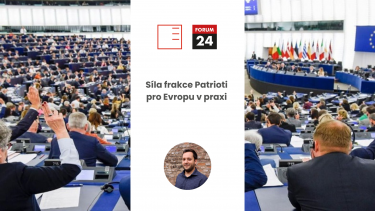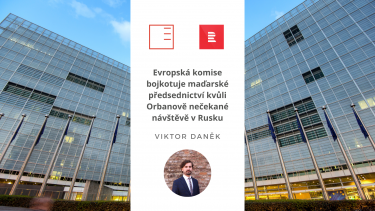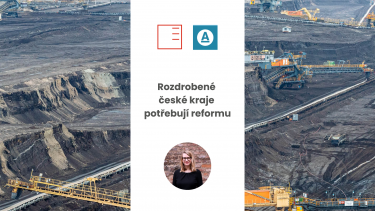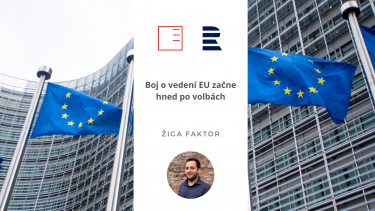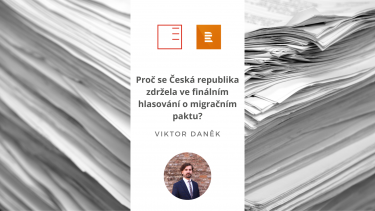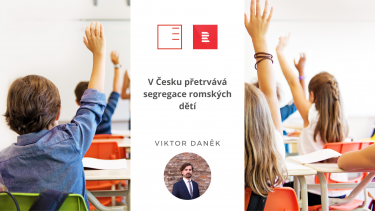e15 | European politicians boycott Hungarian presidency. Will Orbán continue to provoke?
Hungarian Prime Minister Viktor Orbán took over the EU Council presidency less than a month ago, but he has already managed to provoke the EU institutions and most member states with his unauthorized "peace" mission to Russia and China. During this mission, he presented himself as a representative of the European Union, despite having no authority to do so. European politicians have responded to this situation with initial retaliatory measures. How will Viktor Orbán proceed? What strategies and tactics might the Hungarian Prime Minister use during his presidency? Oszkár Roginer-Hofmeister, a research fellow at EUROPEUM Institute, commented on this for e15.
Show more
STVR | Boycott of the Hungarian Presidency in Council of the EU
Most European Union states have decided to boycott the Council meeting in Budapest. This decision is a reaction to Orbán's "peace mission", during which he met with Russian President Putin, Chinese President Xi Jinping, and former US President Trump under the banner of the Hungarian presidency without any mandate from the EU. Will EU criticism slow Orbán down in his next steps? Can Hungary's presidency be revoked? Does EU foreign policy even need to be unified? The situation is commented on by Viktor Daněk, Deputy Director of EUROPEUM Institute.
Show moreFORUM24 | The Impact of the Patriots of Europe Group Power
How could the strengthening of the far right in the European Parliament manifest in practice? How strong and influential could the political group Patriots of Europe become? Could it affect decision-making at the level of the European Council? What developments can we expect in the European Commission under von der Leyen's leadership? Žiga Faktor, Deputy Director and Head of the Brussels Office of EUROPEUM Institute, answered in an interview for FORUM24.
Show more
ČRo | The European Commission boycotts the Hungarian presidency due to Orban's unexpected visit to Russia
The European Commission has announced that, in light of developments since the beginning of the Hungarian presidency of the Council of the European Union, it plans to boycott informal ministerial meetings and send only senior officials instead of commissioners. Viktor Orbán has come under criticism for his recent trip to Russia, which he described as a peace mission aimed at ending the war in Ukraine and which he did not consult with the leaders of other EU states. This move comments Viktor Daněk, deputy director of EUROPEUM Institute for Czech Radio.
Show moreTA3 | Questions about the Hungarian Presidency
Make Europe Great Again is the motto of the Hungarian Presidency of the Council of the European Union. Hungary has set seven priorities, including fighting illegal migration and strengthening European defense. But the next six months raise many questions about the direction the Union will take under Budapest's leadership and what it will mean for Ukraine. Žiga Faktor, deputy director and head of the Brussels office of EUROPEUM Institute, explains the situation for Slovak TV TA3.
Show more
Aktuálně.cz | Fragmented Czech Regions Need Reform
In the autumn, regional council elections will be held. The existence of 14 regions in the Czech Republic, however, does not have a long tradition – they were only established in 2000, partly due to the anticipated entry into the European Union. This arrangement is now heavily criticized for their fragmentation, low and duplicative administrative capacities, and the associated negative impacts on the state budget. Klára Votavová, a researcher at EUROPEUM Institute, presents in her commentary on research on the capacities of the state and regions to draw from the Just Transition Fund, using the examples of the Karlovy Vary and Moravian-Silesian regions.
Show moreCzech radio | The battle for EU leadership will start after the elections
The elections are not the end of the fight for the very leadership of the European Union. The coming weeks and months will decide the new leadership of the European Commission, the European Council, and the European Parliament. What will follow? Deputy Director and Head of the Brussels Office of EUROPEUM Institute, Žiga Faktor, answered questions for Czech Radio stations Radiožurnál and Plus.
Show more
ČRo | Czech Republic abstains in the final vote on the migration pact
The Migration Pact heads to its final vote in the Council of Ministers. The Czech Republic will abstain in this final vote. What is the process of approval within the European Union? What led to the change of position? And what are the implications for the EU of the just-approved migration pact? Viktor Daněk, Deputy Director of EUROPEUM Institute, comments for Czech Radio.
Show moreTA3 | Results of the extraordinary summit in Brussels
At the extraordinary summit of European Council in Brussels, the original economic debates quickly turned to serious geopolitical issues, such as the extension of sanctions against Iran and the strengthening of Ukrainian air defenses. However, as pointed out by Vít Havelka for Slovakian TA3, an analyst at the EUROPEUM Institute, there is no fundamental shift in the EU's approach to countries such as Russia, Israel or Iran.
Show more
iROZHLAS | Segregation of Romani children persists in the Czech Republic
In 2007, the European Court of Human Rights condemned the Czech Republic for discriminating against Romani pupils in their access to education. The Ministry of Education has admitted that this problem continues to this day. Not only is the Czech Republic under scrutiny by the Council of Europe, but it is also at risk of renewed infringement proceedings in the European Union, which could lead to financial sanctions. Viktor Daněk, deputy director of the EUROPEUM Institute, commented on this issue for iROZHLAS.cz.
Show moreStaroměstské náměstí 4/1
Prague 1 - Staré Město
110 00
tel.: +420 212 246 552
email: europeum@europeum.org
https://www.europeum.org


